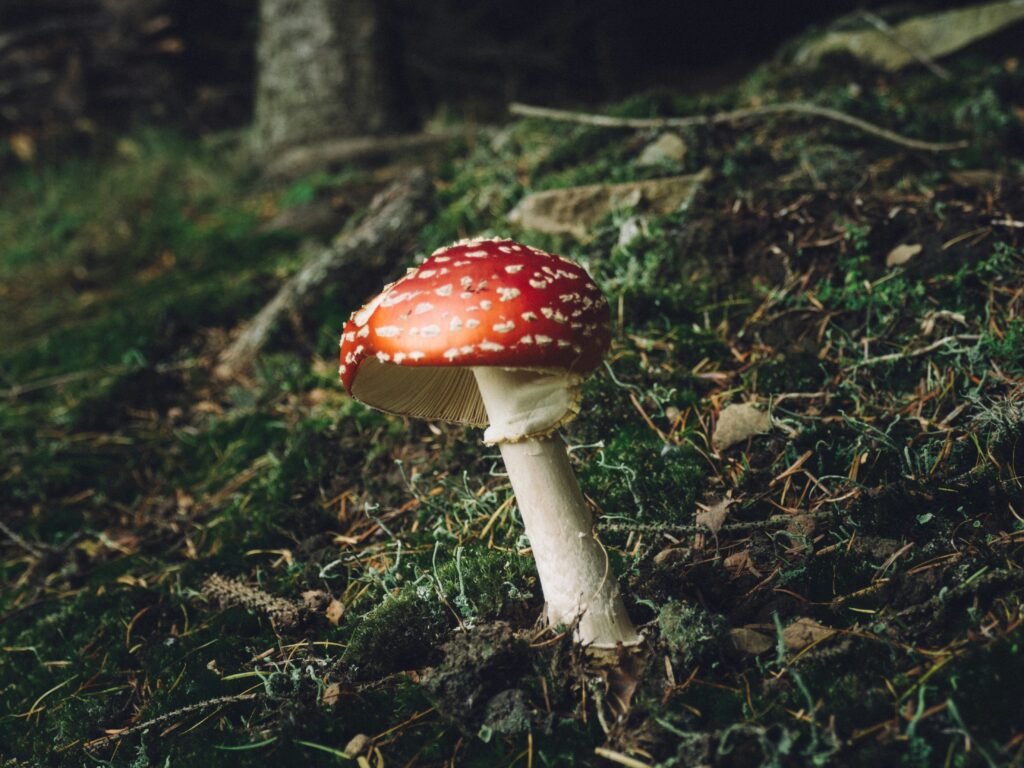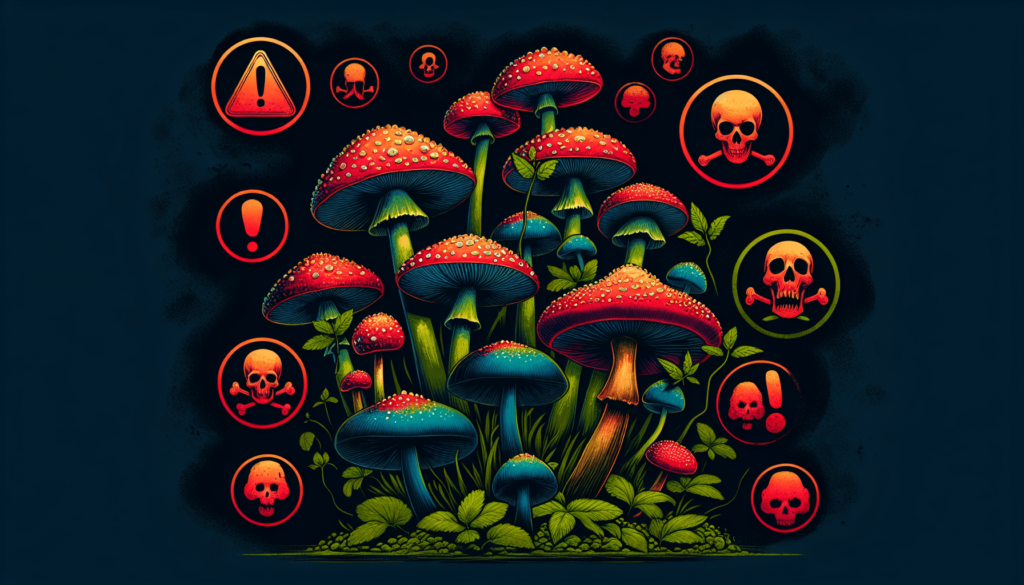Have you ever wondered what happens if you accidentally consume a poisonous mushroom? Will the effects simply fade away with time? In this article, we will explore the intriguing question of whether mushroom poisoning can resolve itself on its own. Whether you’re a curious foodie or someone concerned about the potential dangers lurking in the forest, let’s dig into the facts and discover what fate awaits those who fall prey to these harmful fungi.

Overview of Mushroom Poisoning
Definition of mushroom poisoning
Mushroom poisoning refers to the toxic effects experienced upon ingesting certain species of mushrooms that contain harmful substances. These substances may be naturally occurring toxins or produced by the fungi themselves. Consuming these poisonous mushrooms can lead to a range of symptoms, varying from mild gastrointestinal discomfort to severe organ damage and even death. It is important to note that not all mushrooms are toxic, and proper identification is crucial to avoid poisoning.
Common causes of mushroom poisoning
Mushroom poisoning can occur due to various factors. The most common cause is the accidental consumption of toxic mushrooms, often mistaken for edible varieties. It is vital to be aware that certain poisonous mushrooms closely resemble safe species, making identification challenging for non-experts. Additionally, some individuals intentionally consume toxic mushrooms for recreational purposes, seeking the hallucinogenic effects they may produce. These factors highlight the need for education and awareness regarding mushroom toxicity.
Symptoms of mushroom poisoning
The symptoms of mushroom poisoning can manifest in diverse ways, depending on the specific toxins present and the individual’s susceptibility. Initially, gastrointestinal symptoms such as nausea, vomiting, abdominal pain, and diarrhea may occur within hours of ingestion. These symptoms can be followed by neurological effects, including dizziness, confusion, hallucinations, and seizures. In severe cases, mushroom poisoning can lead to liver and kidney failure, respiratory distress, and cardiovascular complications. It is essential to recognize the signs of poisoning and seek immediate medical assistance.
Types of mushrooms that can cause poisoning
Numerous species of mushrooms are known to be toxic to humans. Some commonly encountered toxic mushrooms include Amanita phalloides (death cap), Amanita virosa (destroying angel), and Gyromitra esculenta (false morel). These mushrooms contain dangerous toxins that can cause severe harm. Other groups of toxic mushrooms include Cortinarius species, Galerina species, and Conocybe species. It is crucial to understand that this list is not exhaustive, and there are many additional toxic mushrooms found worldwide that pose a risk to human health.
Immediate Actions to Take
Contacting emergency services
Upon suspecting mushroom poisoning, it is crucial to contact emergency services immediately. Poison control centers or healthcare professionals can provide vital guidance on how to handle the situation and may advise on the next steps to be taken. Time is of the essence in cases of mushroom poisoning, and prompt medical intervention can make a significant difference in the outcome.
Collecting samples of the mushroom
If possible, collecting samples of the ingested mushrooms is highly beneficial for proper identification and subsequent treatment. Take care to handle the mushrooms with caution, using gloves or utensils, as some toxic compounds can be absorbed through the skin. Collecting the entire mushroom, including the cap, stem, and base, will help experts accurately determine the species and its potential toxicity.
Providing details on ingestion
When seeking medical assistance, be prepared to provide specific details on the ingestion of the mushrooms. This includes the amount consumed, the time of ingestion, and any symptoms experienced thus far. This information will aid healthcare professionals in assessing the severity of the poisoning and determining the appropriate course of action.
Inducing vomiting if advised by professionals
In certain cases and under professional guidance, inducing vomiting may be recommended as an immediate action to remove any remaining toxins from the stomach. However, this should only be done under the direction of medical professionals or poison control centers, as the wrong approach can lead to further complications. Do not attempt to induce vomiting without proper guidance.
Medical Treatment for Mushroom Poisoning
Hospital admission
Mushroom poisoning cases typically require immediate hospital admission for close monitoring and specialized medical care. The hospital environment allows healthcare professionals to closely observe the patient’s condition and administer appropriate treatments promptly. Admission to the intensive care unit (ICU) may be necessary for severe cases to ensure intensified care and support.
Administration of activated charcoal
In cases of recent mushroom ingestion, healthcare professionals may administer activated charcoal. Activated charcoal works by binding to the toxins present in the digestive system, preventing them from being absorbed into the bloodstream. This process aids in reducing the toxic effects of the ingested mushrooms and promoting the elimination of toxins from the body.
Supportive treatments
Supportive treatments play a crucial role in managing mushroom poisoning cases. These may include intravenous fluids to maintain hydration and electrolyte balance, as well as medications to address specific symptoms such as antiemetics to control nausea and vomiting. Analgesics may be prescribed to alleviate pain, while anticonvulsant drugs can help manage seizures.
Specific antidotes for certain toxins
In cases where specific toxins are identified, targeted antidotes may be administered. For example, in cases of Amanita mushroom poisoning, the antidote N-acetylcysteine (NAC) may be used to counteract the toxic effects on the liver. However, it is important to note that not all types of mushroom poisoning have specific antidotes available, highlighting the importance of prompt medical attention and comprehensive supportive care.
Severity and Prognosis
Determining the severity of mushroom poisoning
The severity of mushroom poisoning can vary greatly, ranging from mild gastrointestinal discomfort to life-threatening complications. It is crucial to assess the severity of poisoning promptly to determine the appropriate level of medical intervention. Factors such as the type and amount of mushrooms ingested, the specific toxins present, the time of ingestion, and the individual’s overall health play a role in determining the severity of the poisoning.
Factors affecting prognosis
Several factors can influence the prognosis of mushroom poisoning cases. Prompt medical intervention, including proper supportive care and administration of specific antidotes when available, improves the chances of recovery. The specific toxins involved and the individual’s overall health and age also impact the prognosis. Timely recognition and treatment are crucial in minimizing long-term complications and optimizing the chances of a positive outcome.
Potential complications
Mushroom poisoning can lead to various complications, depending on the toxins involved and the severity of the poisoning. Liver damage, kidney failure, and respiratory distress are among the potential complications that can occur. Additionally, some individuals may experience adverse neurological effects, including seizures, coma, or permanent disabilities. The occurrence of complications underscores the need for immediate medical treatment and ongoing monitoring.
Recovery period
The recovery period following mushroom poisoning can vary significantly, depending on the severity of the poisoning and the individual’s response to treatment. Mild cases may resolve within a few days, while more severe cases may require weeks or even months of medical intervention and supportive care. It is essential for individuals to follow their healthcare professionals’ guidance throughout the recovery process and attend regular follow-up appointments to monitor their progress.

Long-term Effects of Mushroom Poisoning
Organ damage and long-term consequences
Mushroom poisoning, particularly in severe cases, can result in long-term consequences, including organ damage. The liver and kidneys are particularly susceptible to injury due to the toxins present in certain mushrooms. The extent of organ damage can vary depending on the individual and the specific toxins involved, necessitating ongoing monitoring and potential long-term management of these conditions.
Effects on liver and kidneys
Toxic mushrooms, such as Amanita species, can cause significant damage to the liver and kidneys. Liver failure, in particular, is a serious concern and may necessitate a liver transplant in extreme cases. Kidney damage can lead to chronic kidney disease, requiring ongoing management and potential dialysis or transplantation. The long-term effects on these vital organs highlight the importance of early detection, immediate medical intervention, and long-term follow-up care.
Neurological effects and potential disabilities
Some poisonous mushrooms can lead to neurological effects, including seizures, hallucinations, and other cognitive impairments. In severe cases, individuals may experience coma or permanent disabilities. The extent of neurological damage can vary widely, with some individuals recovering fully and others requiring long-term rehabilitative care or assistance. The potential for long-term disabilities highlights the need for comprehensive medical management and ongoing support.
Psychological impact and post-traumatic stress
Mushroom poisoning can have a significant psychological impact on individuals and their families. Surviving a poisoning incident can be traumatic, leading to anxiety, fear, and post-traumatic stress disorder (PTSD) in some cases. It is crucial for healthcare providers to consider the mental health needs of individuals affected by mushroom poisoning and provide appropriate support and resources to address potential psychological repercussions.
Prevention and Education
Importance of mushroom identification
One of the most effective ways to prevent mushroom poisoning is through accurate identification. Engaging in thorough research or consulting with experts before consuming wild mushrooms is crucial. Educating oneself about the physical characteristics and distinguishing features of edible and toxic mushrooms can significantly reduce the risk of accidental ingestion. Taking the time to learn about mushroom identification can prevent dangerous mistakes and protect against potential poisoning.
Avoiding consumption of wild mushrooms
To mitigate the risk of mushroom poisoning, it is advisable to refrain from consuming wild mushrooms altogether, especially for individuals who are not well-versed in mycology. Relying solely on the expertise of experienced foragers or mycologists when identifying and harvesting wild mushrooms can help ensure safety. Obtaining cultivated mushrooms from reputable sources is a safer alternative for those who wish to enjoy the culinary delights mushrooms offer.
Educational resources and awareness campaigns
Educational resources and awareness campaigns play a crucial role in preventing mushroom poisoning. These initiatives aim to educate the general public about the risks associated with consuming toxic mushrooms and promote safe practices. Local poison control centers, environmental organizations, and healthcare providers often offer educational programs, workshops, and informational materials to raise awareness and enhance public understanding of mushroom poisoning.
Role of healthcare professionals in prevention
Healthcare professionals, including physicians, nurses, and pharmacists, play a vital role in preventing mushroom poisoning. They can provide accurate information, offer guidance on safe mushroom identification practices, and emphasize the importance of seeking medical attention promptly in case of ingestion. Healthcare professionals can also collaborate with public health agencies and community organizations to develop and implement prevention strategies, further safeguarding individuals from mushroom poisoning incidents.

Alternative Treatments and Folklore
Traditional remedies and alternative treatments
In various cultures, traditional remedies and alternative treatments for mushroom poisoning have been practiced for centuries. Some folklore suggests the use of specific herbs, teas, or even unusual methods, such as ingesting milk thistle, activated charcoal paste, or raw eggs. However, it is crucial to recognize that these remedies have not been scientifically proven to be effective in treating mushroom poisoning and can delay or impede proper medical care.
Potential risks of relying solely on folklore
Relying solely on folklore and traditional remedies for the treatment of mushroom poisoning can be dangerous. These remedies often lack evidence-based support, and their use may prolong the exposure to toxins or exacerbate the condition. It is essential to prioritize seeking immediate medical attention and following the guidance of healthcare professionals to ensure the best possible outcome in cases of mushroom poisoning.
Importance of seeking medical advice
In all cases of suspected mushroom poisoning, it is crucial to seek medical advice promptly. While traditional remedies and alternative treatments are part of certain cultural practices, their use should not replace professional medical care. Healthcare professionals possess the expertise to provide evidence-based treatments and interventions that can directly address the toxic effects of the ingested mushrooms.
Research on medicinal mushrooms
While mushroom poisoning predominantly focuses on the harm caused by toxic mushrooms, it is worth mentioning the ongoing research on the potential medicinal properties of some fungi. Medicinal mushrooms, such as reishi, cordyceps, and turkey tail, have been studied for their potential therapeutic benefits, including immune modulation and anti-inflammatory properties. However, it is essential to differentiate between these medicinal mushrooms and toxic varieties and to rely on expert guidance for appropriate use.
Case Studies and Statistics
Analyzing real-life cases of mushroom poisoning
Analyzing real-life case studies of mushroom poisoning can provide valuable insights into the dangers and outcomes associated with ingestion of toxic mushrooms. They illustrate the varying levels of severity, highlight the importance of immediate medical intervention, and spotlight the potential complications and long-term effects experienced by individuals affected by poisoning incidents. Examining case studies can also aid in identifying trends, contributing to ongoing research and prevention efforts.
Statistics on mushroom poisoning incidents
Accurate statistics on mushroom poisoning incidents can be challenging to gather due to underreporting and regional variations in data collection. However, available data showcases the global impact of mushroom poisoning. For instance, in North America, the majority of mushroom poisoning cases are caused by the ingestion of poisonous Amanita species. Understanding these statistics can assist healthcare providers, researchers, and policymakers in developing targeted prevention strategies and allocating appropriate resources.
Regional variations in mushroom toxicity
The toxicity of mushrooms can vary greatly depending on the geographic region and local environmental factors. Certain regions may have a higher prevalence of toxic mushroom species, leading to an increased risk of poisoning. Regional variations in mushroom toxicity highlight the importance of understanding the local flora and specific risks associated with consuming wild mushrooms. Collaborating with local experts on mushroom identification and local poisoning patterns can help combat region-specific challenges.
Impact of climate change on mushroom toxicity
Climate change has the potential to influence the occurrence and toxicity of mushrooms. Changes in temperature, precipitation patterns, and ecological dynamics can impact the distribution and abundance of certain mushroom species. This, in turn, may affect the availability of both edible and toxic mushrooms. Studying the correlation between climate change and mushroom toxicity is essential for understanding and predicting the potential impact on human health and informing preventive measures.

Emerging Research and Future Directions
Advancements in mushroom poisoning treatment
Ongoing research and advancements in the treatment of mushroom poisoning hold promise for improving patient outcomes. Scientists and healthcare professionals are investigating new methods, including novel antidotes and innovative therapies, to counteract the toxic effects of mushrooms. These advancements aim to enhance the efficacy and speed of treatment, potentially reducing the long-term consequences associated with mushroom poisoning.
New discoveries in mushroom toxicity
Continued research into mushroom toxicity has led to the discovery of new toxins and their effects on human health. Scientists are continually unveiling previously unknown compounds and their mechanisms of action, contributing to the understanding of mushroom poisoning. These discoveries inform medical interventions, prevention strategies, and educational efforts, improving overall preparedness and patient care.
The potential for mushroom antidotes
The development of specific antidotes for different toxins found in toxic mushrooms is an active area of research. Scientists are exploring the potential for targeted antidotes that can counteract specific toxins’ effects, improving treatment options and outcomes. The advancement of such antidotes holds promise for minimizing the damage caused by toxic mushrooms and reducing the morbidity and mortality associated with mushroom poisoning.
Future directions for prevention and treatment
Looking ahead, prevention and treatment of mushroom poisoning will continue to evolve. Greater emphasis will be placed on educational campaigns, public awareness programs, and widespread dissemination of accurate information to prevent accidental ingestion. Advancements in technology and the development of portable mushroom identification tools may aid in real-time identification of mushrooms, reducing the risk further. Continued research and collaboration among mycologists, toxicologists, and healthcare professionals will pave the way for enhanced prevention and treatment strategies.
Conclusion
Mushroom poisoning is a serious medical concern that requires immediate attention and specialized care. Prompt recognition of symptoms, contacting emergency services, and providing accurate information about the ingestion are crucial first steps. Medical treatment, supportive care, and, when available, specific antidotes play essential roles in countering the toxic effects of mushrooms. The severity of mushroom poisoning can vary widely, and long-term effects may include organ damage, neurological complications, and psychological impact. Prevention through accurate mushroom identification, public education, and awareness campaigns is crucial. Seeking professional medical advice and avoiding reliance on folklore or alternative treatments is essential for optimal outcomes. Ongoing research, emerging treatments, and advancements in mushroom toxicology hold promise for improving patient care and fostering a better understanding of mushroom poisoning. By prioritizing timely medical intervention, promoting public awareness, and encouraging safe practices, we can work towards minimizing the risks associated with mushroom poisoning and protecting the health and well-being of individuals.

